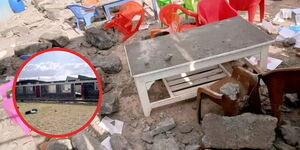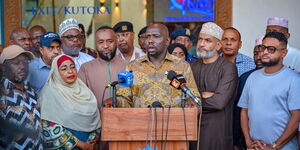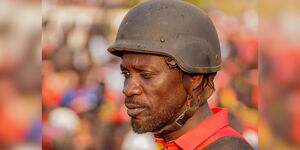The spectres of alleged fraud have resurfaced to challenge Wycliffe Oparanya’s ascent to President William Ruto’s Cabinet. The Ethics and Anti-Corruption Commission (EACC) has raised substantial concerns regarding his integrity, effectively disqualifying him from the role.
A letter from the EACC to National Assembly Clerk Samuel Giorogue, dated 29th July 2024, casts a dark cloud over Oparanya’s nomination as the Cabinet Secretary for Cooperatives and Micro Small and Medium Enterprise Development. The EACC asserts that Oparanya, during his tenure as Governor of Kakamega County, engaged in corrupt activities warranting further investigation.
The Ethics and Anti-Corruption Commission (EACC) Chief Executive Officer Twalib Mbarak confirmed that the investigation into Oparanya's alleged graft remains ongoing.
In a detailed letter addressed to National Assembly Clerk Samuel Njoroge, Mbarak highlighted the singular scrutiny directed at Oparanya, the outgoing Orange Democratic Movement (ODM) deputy party leader. Among the President's other Cabinet nominees, Oparanya is uniquely poised to face the vetting panel on Thursday, August 1.
The EACC's investigation into Oparanya has revealed troubling findings. The commission has pursued preservation orders against Oparanya’s assets, alleging that he possesses ill-gotten gains from his time in office. The accusations suggest conflicts of interest and other forms of corruption, with legal proceedings still ongoing.
"The commission conducted an investigation on allegations of corruption against the nominee for offences committed during his stint as the Governor of Kakamega County," stated the letter, signed by EACC head Twalib Mbarak.
Mbarak elaborated that upon concluding the investigation, the EACC submitted a comprehensive report to the Director of Public Prosecutions (DPP). This report recommended prosecuting Oparanya on multiple charges, including conspiracy to commit an offence of corruption, conflict of interest, abuse of office, and money laundering.
Although Oparanya managed to secure a conservatory order from the High Court, effectively staying any arrest or prosecution based on the EACC's findings, the legal battles are far from over. "The conservatory order was issued by the High Court in Kakamega Constitutional and Human Rights Petition No.E019 of 2023," noted Mbarak in the letter dated 29th July 2024.
Despite the clearance of other nominees, Oparanya faces a formidable blockade. The Public Appointments Act mandates a rigorous vetting process, taking into account the nominee's abilities, experience, and integrity. According to the Constitution’s Chapter 6 on leadership and integrity, the EACC’s findings play a critical role in determining a nominee's suitability for office.
The current scenario casts doubt on Oparanya’s future in President Ruto's administration. As the EACC’s report becomes a pivotal piece of the vetting process, Oparanya’s past actions and the integrity concerns they raise may ultimately decide his fate.
Today, five other Cabinet Secretary nominees are also under scrutiny. Prof Kithure Kindiki, nominated for Interior and National Administration, will be the first to face the vetting panel. This familiar ground for Kindiki, previously vetted for the same docket, now comes with new challenges. His prior performance and handling of security issues, including the contentious police actions during protests, will be closely examined.
Dr Debra Mlongo Barasa, nominated for Health, is expected to address questions about her strategy for managing restive health unions and rolling out new health initiatives. Alice Wahome, returning to the Lands docket, will need to convince the panel of her capabilities amidst ongoing land disputes. Julius Ogamba, the Education nominee, will face scrutiny over his plans for addressing teacher salary issues and the status of intern teachers. Lastly, Soipan Tuya, the Defence nominee, will outline her vision for the ministry amidst pressing national security concerns.












